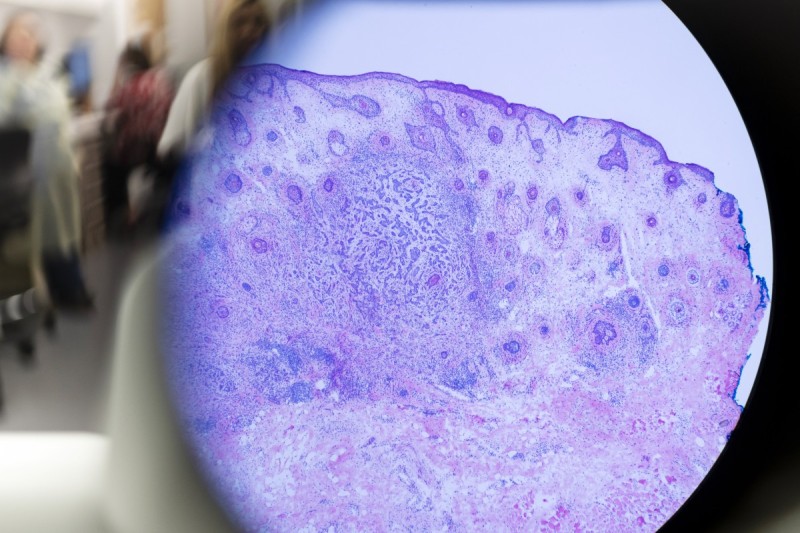
New research from Memorial Sloan Kettering Cancer Center (MSK) developed CAR T cells that target two acute myeloid leukemia-specific antigens; shed new light on a genetic element called LINE-1, opening the door to new treatments; identified a key regulator of blood stem cell fate; and found an immunotherapy technique using antibodies that target CD47 shows promise in mice.
CAR T Cells that target two antigens treat AML with minimal toxicity
Acute myeloid leukemia (AML) has so far resisted treatment with chimeric antigen receptor (CAR) T cell therapy. One reason is that AML cells have different target antigens from cell to cell within the same patient. In addition, AML cells share antigens with normal blood stem cells, which give rise to many blood cells, including immune cells. Conventional CAR T therapy targeting AML could inadvertently weaken the entire immune system, requiring the patient to have a “rescue” bone marrow transplant.
Now, physician-scientist Michel Sadelain, MD, PhD, a pioneer in CAR T cell research, has developed an ingenious tactic for solving this problem. Working with senior research scientist Sascha Haubner, MD, Sadelain’s team designed so-called cooperative CAR T cells that detect two AML antigens — ADGRE2 and CLEC12A — at once. This helps the CAR T cells eliminate AML cells while sparing normal blood stem cells and causing severe effects. A clinical trial using this approach is set to begin at MSK soon under the direction of hematologic oncologist Jae Park, MD. Read more in Cancer Cell.
Structure-based study opens door to new treatments targeting key LINE-1 protein
A study co-led by researchers at MSK is shedding new light on a genetic element called LINE-1, which is responsible for writing at least a third of the human genome via a process known as reverse transcription (synthesizing DNA from an RNA template). LINE-1 contains the remnants of ancient virus-like genomic parasites that were integrated into our genetic material over millions of years of evolution. LINE-1 is normally silenced but gets activated in cancer and other diseases.
The study — which included co-senior author Benjamin Greenbaum, PhD, and co-first author David Hoyos, a doctoral student in the Tri-Institutional Computational Biology & Medicine program — obtained the first X-ray crystallography structure of a key enzyme involved in LINE-1’s activity called ORF2p. The work shows how ORF2p interacts with the immune system and how drugs might target it. MSK led the novel computational and evolutionary analysis of ORF2p, showcasing how it is similar to and different than other molecules that are responsible for reverse transcription. “Surprisingly, we found it is more similar to some viral polymerases than to other reverse transcriptases,” Greenbaum says. “Along with opening the door for new treatments, the findings have important implications for ‘viral mimicry,’ a topic my lab has worked on for years that tells us about how virus-like sequences in our genome interact with the immune system.” Read more in Nature.
Research identifies key regulator of blood stem cell fate
Research led by MSK and the New York Genome Center has uncovered a new regulator of blood-forming stem cells and a new way in which blood stem cells control inflammation. The study — led by co-first authors Hanzhi Luo, PhD, a postdoctoral fellow at MSK and Mariela Cortés-López, PhD, a postdoc at the genome center and Weill Cornell Medicine — found a gene called SON that is a key controller of blood stem cell fate. The team also showed that levels of the SON protein decrease when a type of RNA modification called m6A RNA methylation is hampered, leading to defects in stem cell commitment and function. SON also plays a role in controlling inflammation by reducing the expression of proinflammatory genes, the team reported.
“Our findings also suggest that targeting SON and its downstream program may be a promising strategy for expanding blood stem cell populations,” says senior study author Michael Kharas, PhD, a cancer biologist at MSK’s Sloan Kettering Institute. “Along with providing new insights into the way stem cells control their fate and their role in controlling inflammation, our findings may help understand the impact of cancer treatments that work by inhibiting RNA methylation.”
The study also highlights SON’s role in a rare genetic disease called ZTTK syndrome, in which spontaneous mutations in SON lead to brain and blood defects. Read more in Cell Stem Cell.
New immunotherapy technique shows promise in mice
Advances in immunotherapies, treatments that arm the immune system with new tools to recognize and attack cancer cells, have benefitted many people with different types of cancer, but they are not effective for everyone. Ongoing research at MSK is dedicated to investigating why this occurs and developing new strategies to make immunotherapy work for more people with cancer.
A new study led by gynecologic oncologist Juan Osorio, MD, investigated how antibodies that target CD47, a protein found in high volumes in cancer cells, can be harnessed in immunotherapy. Dr. Osorio and his team created novel antibodies in the lab that had an increased capacity to identify and eliminate cancer cells expressing CD47. Investigators studied these effects in genetically engineered mice, finding the approach improved long-term systemic antitumor immunity. The results suggest this could be a promising area of study for future clinical trials. Read more in Cancer Cell.